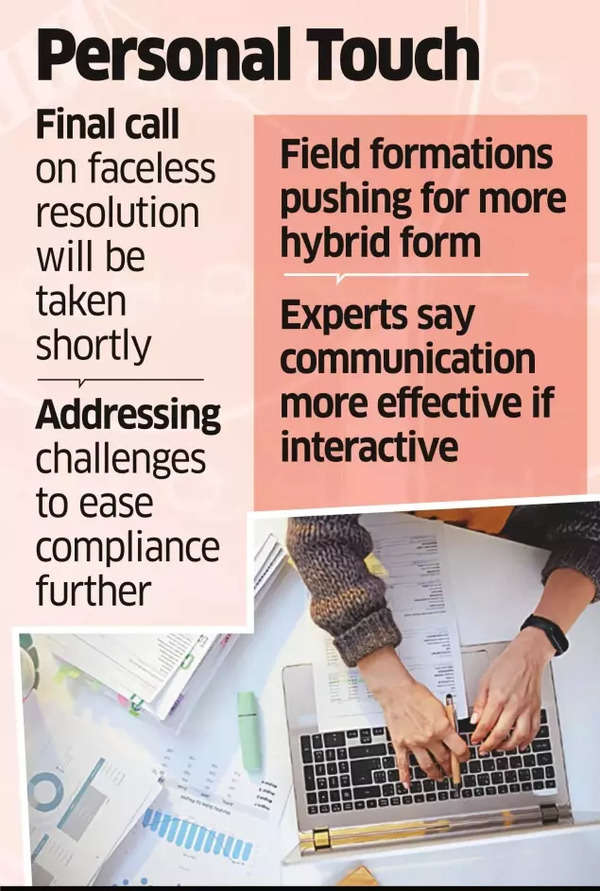- News
- Business News
- India Business News
- Relief for taxpayers soon? ‘Faceless' income tax assessment mechanism to be made friendlier
Trending
Relief for taxpayers soon? ‘Faceless' income tax assessment mechanism to be made friendlier
Efforts are ongoing to enhance compliance and streamline the faceless income tax assessment system, addressing challenges such as adverse orders due to video conferencing and a long pendency for faceless appeals even after taxpayers submit responses.

A hybrid approach is under consideration, which would allow taxpayers to choose between the faceless scheme and in-person resolution.
Income Tax Assessment mechanism to be more taxpayer friendly? The Indian government is currently evaluating the 'faceless' income tax (I-T) assessment system to enhance its taxpayer-friendliness, based on recommendations for improving the program's effectiveness.
Introduced on April 1, 2021, the scheme was designed to minimize human interaction in tax disputes and assessments.Under this system, the income tax department handles return processing, refund issuance, tax assessments, scrutiny, and appeal management. Cases are randomly assigned to assessing officers, irrespective of geographical jurisdiction.
Sources familiar with the matter told ET that a hybrid approach is under consideration, which would allow taxpayers to choose between the faceless scheme and in-person resolution. "It is being reviewed to assess effectiveness," an official was quoted as saying. He also said that making it optional for taxpayers is a potential solution.
Another official mentioned that the aim is to tackle implementation challenges and further simplify compliance for taxpayers. The final decision will be made soon, the official added.

Although the video conferencing-based assessment system is considered stable, there has been an increasing demand from both individual and business taxpayers to allow some level of in-person interaction. Additionally, the income tax department's field formations have been advocating for a more hybrid approach to ensure optimal and effective resource utilization.
Assessing taxes is a multifaceted process, and experts believe that interactive communication between the taxpayer and the tax officer can lead to more effective outcomes.
Also Read | Form 26 AS: Filing Income Tax Return? Know why Form 26AS is important & how to download it
Sudhir Kapadia, partner, tax and regulatory services, EY, said, "Especially in the case of large and complex matters requiring detailed explanations and huge amount of data to be produced, it has been observed that sufficient time has sometimes not been given for taxpayers to prepare and upload their facts and arguments, resulting in unwarranted adjustments."
Kapadia highlighted that when a case enters the first-level appeal process, it becomes part of a lengthy queue, contributing to the accumulation of pending cases at the commissioner of income tax (appeals) level, where the system faces its most significant hurdle.
"There is a crying need to expedite these long-pending appeals by prioritising cases, enabling technology support to the commissioner, and effective real-time monitoring of disposals by the CBDT (Central Board of Direct Taxes)," he emphasized.
Kapadia also noted that in the faceless system, there have been numerous instances of discrepancies between the portal of the jurisdictional assessing officer and the Central Processing Centre's systems. As a consequence, refunds remain stuck indefinitely without any resolution.
Also Check | Filing Income Tax Return For FY 2023-24? Form 16 To AIS - Top Documents Salaried Taxpayers Should Check Before ITR Filing On e-Filing Portal
Taxpayers have encountered issues while explaining the intricacies of their businesses to assessing officers via video conferencing, as the officers may lack the necessary knowledge or expertise, resulting in unfavorable orders. Tax experts have reported that startups and fund houses are particularly affected by this problem. Additionally, individuals have expressed similar concerns regarding virtual interactions.
Kuldip Kumar, a partner at Mainstay Tax Advisors, pointed out the lengthy duration of the process, stating, "For faceless appeals, there is currently a long pendency in disposal of appeals, even after submission of final response by taxpayers."
According to Akhil Chandna, partner, direct tax, Grant Thornton Bharat, "Taxpayers are facing certain challenges that need to be addressed to make the overall faceless scheme more effective." He highlighted difficulties such as the absence of a specific option for seeking adjournment, problems with uploading large files online, and insufficient time provided to taxpayers for responding to notices.
Introduced on April 1, 2021, the scheme was designed to minimize human interaction in tax disputes and assessments.Under this system, the income tax department handles return processing, refund issuance, tax assessments, scrutiny, and appeal management. Cases are randomly assigned to assessing officers, irrespective of geographical jurisdiction.
Sources familiar with the matter told ET that a hybrid approach is under consideration, which would allow taxpayers to choose between the faceless scheme and in-person resolution. "It is being reviewed to assess effectiveness," an official was quoted as saying. He also said that making it optional for taxpayers is a potential solution.
Another official mentioned that the aim is to tackle implementation challenges and further simplify compliance for taxpayers. The final decision will be made soon, the official added.

Income Tax Assessment
Although the video conferencing-based assessment system is considered stable, there has been an increasing demand from both individual and business taxpayers to allow some level of in-person interaction. Additionally, the income tax department's field formations have been advocating for a more hybrid approach to ensure optimal and effective resource utilization.
Assessing taxes is a multifaceted process, and experts believe that interactive communication between the taxpayer and the tax officer can lead to more effective outcomes.
Also Read | Form 26 AS: Filing Income Tax Return? Know why Form 26AS is important & how to download it
Sudhir Kapadia, partner, tax and regulatory services, EY, said, "Especially in the case of large and complex matters requiring detailed explanations and huge amount of data to be produced, it has been observed that sufficient time has sometimes not been given for taxpayers to prepare and upload their facts and arguments, resulting in unwarranted adjustments."
Kapadia highlighted that when a case enters the first-level appeal process, it becomes part of a lengthy queue, contributing to the accumulation of pending cases at the commissioner of income tax (appeals) level, where the system faces its most significant hurdle.
"There is a crying need to expedite these long-pending appeals by prioritising cases, enabling technology support to the commissioner, and effective real-time monitoring of disposals by the CBDT (Central Board of Direct Taxes)," he emphasized.
Kapadia also noted that in the faceless system, there have been numerous instances of discrepancies between the portal of the jurisdictional assessing officer and the Central Processing Centre's systems. As a consequence, refunds remain stuck indefinitely without any resolution.
Also Check | Filing Income Tax Return For FY 2023-24? Form 16 To AIS - Top Documents Salaried Taxpayers Should Check Before ITR Filing On e-Filing Portal
Taxpayers have encountered issues while explaining the intricacies of their businesses to assessing officers via video conferencing, as the officers may lack the necessary knowledge or expertise, resulting in unfavorable orders. Tax experts have reported that startups and fund houses are particularly affected by this problem. Additionally, individuals have expressed similar concerns regarding virtual interactions.
Kuldip Kumar, a partner at Mainstay Tax Advisors, pointed out the lengthy duration of the process, stating, "For faceless appeals, there is currently a long pendency in disposal of appeals, even after submission of final response by taxpayers."
According to Akhil Chandna, partner, direct tax, Grant Thornton Bharat, "Taxpayers are facing certain challenges that need to be addressed to make the overall faceless scheme more effective." He highlighted difficulties such as the absence of a specific option for seeking adjournment, problems with uploading large files online, and insufficient time provided to taxpayers for responding to notices.
End of Article
FOLLOW US ON SOCIAL MEDIA
















